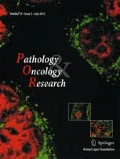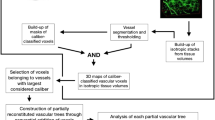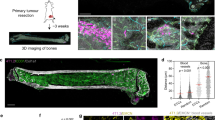Abstract
Bone may provide an extremely fertile microenvironment for angiogenesis. Experimental investigations indicate angiogenesis as a major regulator of bone metastasis development. Vascularization and angiogenic potential is known for most of the primary tumor types, but no studies investigated angiogenesis in bone metastases of human cancers. We have evaluated microvessel density of bone metastases of various cancer types (all adenocarcinomas) and compared to their primary tumors in paraffin samples of 39 patients. Microvessel density was determined by using the hot spot method and the blood vessel marker, CD34. The most vascularized adenocarcinoma was found to be renal cell cancer followed by lung adenocarcinoma, while breast cancer was heterogenous in this respect. Two patterns of modulation of the angiogenic phenotype in the bone metastases emerged in this study, which seemed to be cancer type specific: decreased angiogenic potential characterizing 45% of renal cell cancers and breast cancers of high vascularity in their primary, and increased angiogenic potential characterizing 40% of lung adenocarcinomas and breast cancers of low vascularity in their primary lesion. Our data demonstrate that i., the vascularization of bone metastases is frequently altered compared to the primary tumors, ii., patterns are different in the case of various cancer types. The tumor-type specific alterations of the angiogenic phenotype of cancers, metastatic to the bone, can have a clinical significance when angiosuppressive therapies are considered.
Similar content being viewed by others
References
Hasan J, Byers R, Jayson GC. Intra-tumoral microvessel density in human solid tumours. Br J Cancer 86:1566–1577, 2002
Yoneda T. Cellular and molecular mechanisms of breast and prostate cancer metastasis to bone. Eur J Cancer 34:240–245, 1998
Saaristo A, Karpanen T, Alitalo K. Mechanisms of angiogenesis and their use in the inhibition of tumor growth and metastasis. Oncogene 19:6122–6129, 2000
Winding B, Misander H, Sveigaard C et al. Human breast cancer induced angiogenesis, recruitment, and activation of osteoclasts in osteolytic metastasis. J Cancer Res Clin Oncol 126:631–640, 2000
Van der Pluijm G, Sijmons B, Vloedgraven H, et al: Monitoring metastatic behavior of human tumor cells in mice with species-specific polymerase chain reaction: elevated expression of angiogenesis and bone resorption stimulators by breast cancer in bone metastases. J Bone Miner Res 16:1077–1091, 2001
Woodhouse EC, Chuaqui RF, Liotta LA. General mechanisms of metastasis. Cancer 80:1529–1537, 1997
Ellis LM, Liu W, Ahmad SA et al. Overview of angiogenesis: Biologic implications for antiangiogenic therapy. Semin Oncol 28:94–104, 2001
Kovacs L, Szende B, Elek G et al. Working experience with a new vacuum-accelerated microwave histoprocessor. J Pathol 180:106–110, 1996
Weidner N, Semple JP, Welch WR, Folkman J. Tumor angiogenesis and metastasis-correlation in invasive breast carcinoma. N Engl J Med 324:1–8, 1991
Mundy GR. Metastasis to bone: causes, consequences and therapeutic opportunities. Nat Rev Cancer 2:584–593, 2002
Yang JC, Haworth L, Sherry RM et al. A randomised trial of bevacizumab, an anti-vascular endothelial growth factor antibody, for metastatic renal cancer. N Engl J Med 349:427–434, 2003
Hurwitz H, Fehrenbacher L, Novotny W et al. Bevacizumab plus irinotecan, fluorouracil and leucovorin for metastatic colorectal cancer. N Engl J Med 350:2335–23342, 2004.
Author information
Authors and Affiliations
Corresponding author
Additional information
This work was supported by NKFP1/48/2001, Hungarian Ministry of Education.
Rights and permissions
About this article
Cite this article
Lórincz, T., Tímár, J. & Szendrói, M. Alterations of microvascular density in bone metastases of adenocarcinomas. Pathol. Oncol. Res. 10, 149–153 (2004). https://doi.org/10.1007/BF03033743
Received:
Accepted:
Issue Date:
DOI: https://doi.org/10.1007/BF03033743




